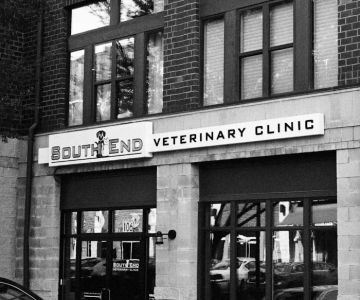What's Veterinary? Understanding the Veterinary Profession and Services
- 1. What is Veterinary Care?
- 2. What Does "Veterinary" Mean?
- 3. The Various Veterinary Services Available
- 4. Specializations Within the Veterinary Profession
- 5. A Real-Life Experience with Veterinary Services
- 6. How to Choose the Right Veterinary Care for Your Pet
1. What is Veterinary Care?
When people ask, "What's veterinary?", they're typically referring to the profession that focuses on the medical care of animals. Veterinary care involves everything from diagnosing and treating illnesses in animals to providing preventive care, surgeries, and emergency services. Veterinary services aren't just limited to household pets like cats and dogs, but also extend to livestock, wildlife, and even exotic animals.
As a pet owner, I’ve personally relied on veterinary services to keep my animals healthy. Whether it’s routine checkups or more serious medical procedures, I’ve seen firsthand how important it is to have access to skilled veterinarians who are passionate about animal health. Veterinary care is crucial for maintaining the overall well-being of animals, preventing disease, and providing life-saving treatments when needed.
2. What Does "Veterinary" Mean?
The term "veterinary" is derived from the Latin word “veterinarius,” which means "working animals" or "beasts of burden." Essentially, it refers to the care, treatment, and maintenance of the health of animals. Veterinary professionals are experts who specialize in diagnosing and treating health issues that affect animals. They are trained to understand the anatomy, diseases, and needs of various species, allowing them to provide tailored treatments for a wide range of animals.
Veterinary professionals include not just veterinarians, but also veterinary technicians, nurses, and specialists who work together to ensure that animals receive the best care possible. In fact, veterinarians undergo extensive education, usually earning a Doctor of Veterinary Medicine (DVM) degree, to become qualified to practice veterinary care. This rigorous training ensures that they can manage complex medical conditions and provide the highest level of care to their patients.
3. The Various Veterinary Services Available
Veterinary services cover a broad range of areas to meet the diverse needs of animals. Here are some of the most common types of services that fall under the umbrella of veterinary care:
3.1 Routine Health Check-ups
Just like humans, animals need regular health check-ups to ensure they are in good health. These visits usually include physical exams, vaccinations, and parasite prevention. Routine check-ups are vital for detecting early signs of disease, allowing for faster intervention and better outcomes. I’ve always made sure to take my pets for regular checkups, and it has helped catch issues early on, preventing more serious health problems down the line.
3.2 Diagnostic Services
Veterinary practices also provide diagnostic services to identify and understand underlying health issues. This can include laboratory tests, imaging, and blood work. These services help veterinarians determine the exact cause of symptoms or illnesses, allowing them to provide the most effective treatment plan. In one instance, when my dog suddenly developed lethargy, diagnostic tests revealed an underlying infection, which was treated successfully with the right medications.
3.3 Emergency Care
Emergencies can happen at any time, and knowing that there are veterinary clinics equipped to handle critical situations is reassuring. Emergency veterinary services are designed to address immediate health concerns such as injuries, poisoning, or sudden illness. Having a reliable emergency veterinary service nearby provides peace of mind in case something unexpected happens. I’ve had to use emergency veterinary services before, and they have been lifesaving during critical situations.
3.4 Surgical Procedures
Surgical care is another important part of veterinary services. Whether it's for routine spaying or neutering, or more complicated surgeries like tumor removal or fracture repair, veterinary hospitals are equipped to perform various procedures. In some cases, specialized equipment and expertise are required, making it essential to choose a veterinary clinic with experienced surgeons. My cat had to undergo surgery to remove a tumor, and the procedure went smoothly thanks to the skilled veterinary team.
4. Specializations Within the Veterinary Profession
The veterinary profession encompasses several specialized areas of expertise. These specialists focus on specific aspects of animal health and provide advanced care in their field. Some of the most common specializations within veterinary medicine include:
4.1 Veterinary Dermatology
Veterinary dermatologists specialize in diagnosing and treating skin conditions in animals. Whether it’s allergies, infections, or chronic conditions like eczema, these specialists can provide targeted treatments and relief. I’ve personally worked with a veterinary dermatologist to treat my dog’s chronic skin condition, and their expertise made all the difference in managing her symptoms.
4.2 Veterinary Cardiology
Veterinary cardiologists focus on diagnosing and treating heart conditions in animals. From arrhythmias to heart murmurs, these specialists use advanced diagnostic tools like echocardiograms and ultrasounds to provide effective treatments. My friend’s dog was diagnosed with heart failure, and seeing a veterinary cardiologist significantly improved his quality of life.
4.3 Veterinary Oncology
Veterinary oncologists specialize in the diagnosis and treatment of cancer in animals. This is a challenging area, but with the right care, many pets can live comfortably with cancer for extended periods. I remember when a neighbor’s dog was diagnosed with cancer, and they sought out a veterinary oncologist who developed a treatment plan that greatly improved the dog’s prognosis.
5. A Real-Life Experience with Veterinary Services
When I think of the importance of veterinary care, one experience stands out. My dog, Max, had been acting unusually lethargic for a few days, and I knew something was wrong. I took him to my local veterinary clinic, where the staff performed several diagnostic tests. They quickly identified that he had a kidney infection, which required immediate treatment. Thanks to the care he received, Max made a full recovery. This experience really emphasized how crucial veterinary services are in keeping pets healthy and happy.
6. How to Choose the Right Veterinary Care for Your Pet
Choosing the right veterinary care for your pet is essential for their health and well-being. Here are some key factors to consider when selecting a veterinary practice:
6.1 Reputation and Experience
Look for a veterinary practice with a solid reputation in the community. Online reviews, recommendations from friends or family, and word of mouth are great ways to assess a clinic’s reliability and expertise. It’s also important to consider the experience of the veterinarians and whether they have experience treating your pet’s breed or specific condition.
6.2 Services Offered
Make sure the veterinary clinic you choose offers the services that meet your pet’s needs. If your pet requires specialized care or frequent visits, look for a clinic with the necessary facilities and specialists. I personally prioritize clinics that offer emergency services, diagnostic capabilities, and specialty care.
In conclusion, understanding what's veterinary and the range of services offered by veterinary professionals can help you make informed decisions about your pet’s health. Whether it’s routine checkups, emergency care, or specialized treatment, there’s a veterinary professional ready to help. I encourage you to choose a trusted veterinary provider for your pet’s care to ensure they live a long, healthy, and happy life.











